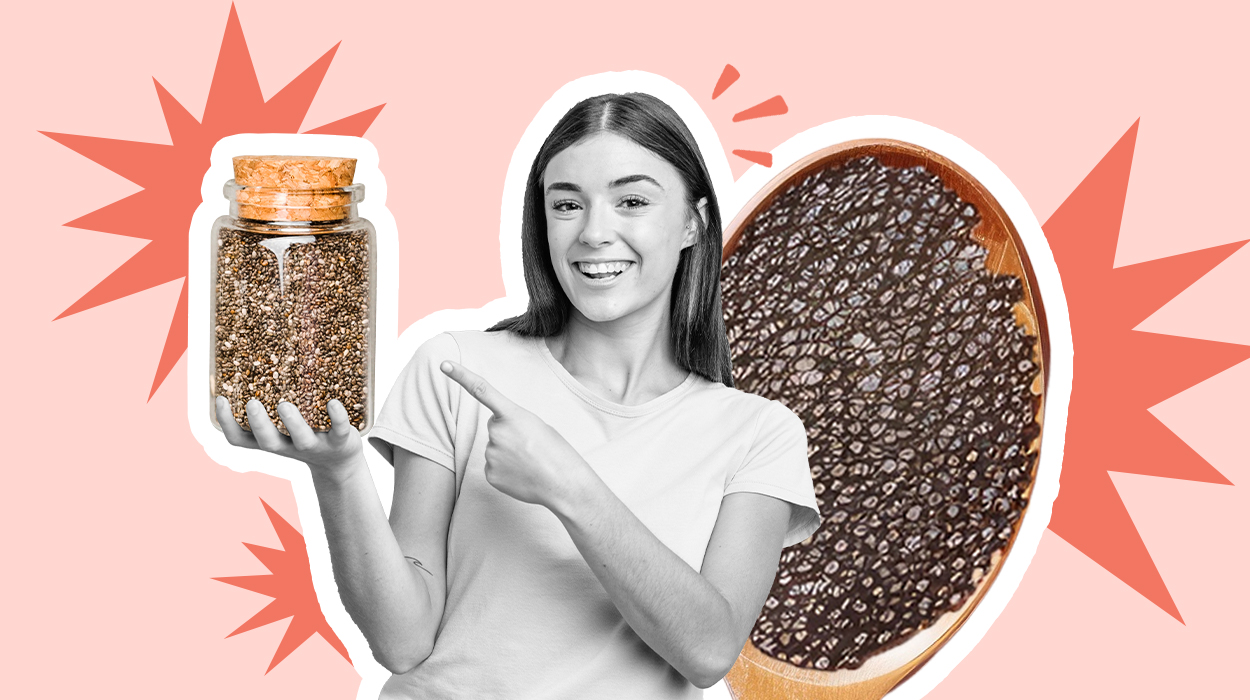Chia seeds, long celebrated as a superfood, have been a staple in the diets of ancient civilizations like the Aztecs and Mayans. They offer multiple health benefits and are rich in antioxidants, fiber, protein, and omega-3 fatty acids. Therefore, chia seeds for weight loss are well established. But can these tiny seeds enhance your sexual health? The answer might surprise you.
Does Chia Seeds Help Sexually?
Chia seeds, which contain essential fatty acids, have been linked to maintaining hormonal balance and enhancing mood, two key components of sexual desire. While they can indeed act as a subtle natural aphrodisiac, they are not a replacement for medical interventions.
Benefits Of Chia Seeds Sexually

The sexual benefits of chia seeds extend from their rich nutritional profile. Whether it’s improving blood flow, enhancing sexual desire, or contributing to both men’s and women’s health, these tiny seeds have a significant role to play.
Improving Blood Flow
Some research[1] suggests that incorporating chia seeds for sex drive enhancement can be beneficial due to their omega-3 fatty acids. These fatty acids are healthy fats that promote cardiovascular health. They help lower high blood pressure and plaque formation in blood vessels. This results in better circulation and keeps the blood pumping efficiently.
Improved blood flow is particularly beneficial to sexual function, especially in men, where it aids in achieving and maintaining erections, thus potentially increasing male libido. Enhancing circulation can improve sensitivity and arousal for women, promoting sexual satisfaction.
Balancing Hormones
The essential nutrients in chia seeds, particularly omega-3s, support hormone production. A stable hormonal balance can lead to improved mood, increased libido, and an overall healthier sex life.
In men, a balanced diet rich in essential fatty acids can support testosterone levels, which plays a crucial role in male libido and sexual function.[2] When it comes to the benefits of chia seeds sexually, female libido and fertility also improve. The dietary intake of omega-3s can influence the production and balance of hormones. This not only improves sexual desire but may increase fertility in females.
Supporting Reproductive Health
Zinc, present in chia seeds, is essential for reproductive health. In men,[3] it contributes to prostate health, sperm production, and testosterone levels. In women, it helps with hormonal balance and may assist in managing symptoms of conditions like polycystic ovarian syndrome (PCOS), thereby contributing positively to women’s health.[4]
Boosting Energy Levels
Chia seeds packed full of antioxidants and healthy fats, are known for their energy-boosting properties. They help to maintain steady energy levels, which can be beneficial in sustaining sexual activity.
Promoting Brain Health
The omega-3 fatty acids in chia seeds also contribute to brain health. They support the nervous system and enhance mood, a factor that can significantly impact sexual desire and satisfaction. Check out our NothingFishy reviews for other sources of this vital nutrient.
Chia Seeds Nutrition Is Beneficial
Chia seeds bring a lot of benefits to your body and mind. Whether it’s trying to balance hormones, enhance your love life, or simply contribute to overall well-being, their rich nutritional content plays a role.
Here are some of the essential nutrients found in chia seeds and their health benefits:
- Dietary fiber: Chia seeds are high in dietary fiber, which aids digestion and helps to stabilize blood sugar levels. Stable blood sugars can prevent energy spikes and crashes, balance energy levels enhance sexual activity.
- Antioxidants: They are packed with antioxidants that combat free radicals and reduce inflammation in the body. This aids in maintaining overall body health.
- Protein and amino acids: Chia seeds are a good source of protein and essential amino acids, the body’s building blocks. They can help maintain muscle health, a key component in sexual satisfaction.
- Omega-3 fatty acids: Known as healthy fats, the omega-3 fatty acids found in chia seeds contribute to brain and heart health by reducing high blood pressure and improving circulation. This, in turn, can enhance blood flow to sex organs, improving sexual desire and performance.
- Calcium, Phosphorus, and Zinc: These minerals are vital for bone health, reproductive health, and immune function. Zinc, in particular, is known to support male fertility, sperm production, and testosterone levels.
Chia seeds are among the best foods for those following a vegan diet or looking for plant-based nutrient sources. They are often in competition with flaxseeds as the “Best vegan omega-3 supplement.”
How Much Chia Seeds Should You Eat Daily?
While chia seeds are nutrient-dense, moderation is key. Consuming about 1-2 tablespoons of chia seeds per day is recommended to reap their health benefits without overloading on fiber.
Potential Risks
While chia seeds are highly nutritious and beneficial to health, it’s also important to consider the potential risks and side effects of chia seeds. Consuming chia seeds in moderation as part of a balanced diet is generally considered safe for most people. However, there are a few risks and side effects to be aware of
Digestive Issues
Chia seeds are a rich source of fiber. While fiber is beneficial for digestive health, consuming excessive amounts can lead to digestive issues like gas, bloating, or diarrhea, especially if the body is not used to a high-fiber diet. This is why it’s crucial to increase fiber intake gradually and stay well-hydrated.
Allergic Reactions
Though rare, chia seeds can cause allergic reactions. Symptoms include skin rashes, watery eyes, vomiting, diarrhea, and difficulty swallowing. Those with a history of food allergies should consult a healthcare professional before incorporating chia seeds into their diet.
Potential Interference With Medications
Due to their high omega-3 content and fiber, chia seeds could potentially interfere with certain medications. For instance, they could affect the absorption of certain drugs or exaggerate the blood-thinning effects of anticoagulants. Therefore, it’s advisable to consult a healthcare provider if you’re on any medication before you start consuming chia seeds regularly.
Choking Hazard
Chia seeds can absorb large amounts of water, expanding in size and turning into a gel-like substance. If consumed dry and without sufficient liquids, they could pose a choking risk, particularly in elderly individuals and children.
Possible Hormonal Effects
Some preliminary research suggests that flaxseeds and possibly chia seeds, due to their lignan content, might have a slight effect on hormone levels and the menstrual cycle, although more research is needed in this area. Women with hormone-sensitive conditions, such as endometriosis or breast cancer, should consult with a healthcare professional before incorporating large amounts of chia seeds into their diet.
Can Chia Help Erectile Dysfunction & Sexual Desire?
Erectile Dysfunction (ED)[5] is a common issue in men’s health. ED is characterized by changes in various components of the erectile response, including organic, relational, and psychological aspects. It’s significantly linked with metabolic syndrome[6] and cardiovascular disease, emphasizing the importance of heart health in maintaining a robust sex life.
The components of chia seeds, including antioxidants, omega-3 fatty acids, vitamins, minerals, peptides, and polyphenols, are known to enhance cardiovascular and metabolic health.[7] These potent packets of nutrition can reduce blood pressure, platelet aggregation, cholesterol levels, and inflammation, leading to improved blood circulation.
Research[8] into the link between omega-3 fatty acids, heart health, and improved blood flow is ongoing. Better circulation might potentially augment sexual function by helping to achieve and maintain erections.
While chia seeds can support cardiovascular health and potentially alleviate symptoms of ED, they are not a substitute for professional medical advice, diagnosis, or treatment. If you’re grappling with issues related to sexual function, consult a healthcare professional to explore all possible causes and treatment options.
Other Foods That Help Make You Better At Sex
Aside from chia seeds, many foods have been linked to better sexual health due to their specific nutrient profiles. Incorporating these into a balanced diet may contribute to a healthy sex life. Here are some examples:
- Dark chocolate: Rich in flavonoids, dark chocolate[9] can help lower blood pressure, improve blood flow, and promote overall heart health. Some studies also suggest it may enhance mood, which could indirectly increase libido.
- Oysters: Known as a traditional aphrodisiac, oysters are high in zinc,[10] which is important for testosterone production and sperm health in men and hormone regulation in women.
- Red wine: In moderation, red wine[11] can help increase blood flow and improve circulation due to its high antioxidant content. However, excessive alcohol consumption can have the opposite effect.
- Pomegranates: Are packed with antioxidants that support heart health and improve blood circulation. Some research[12] also links pomegranate juice to increased testosterone levels, which could improve sexual desire in both sexes.
- Pumpkin seeds: Rich in magnesium, which can increase testosterone levels in men. They’re also a good source of tryptophan,[13] an amino acid that helps produce serotonin, a hormone that influences mood and sexual desire.
- Olive oil: Full of heart-healthy fats, olive oil can help improve blood flow and potentially boost erectile function.[14] It also supports hormone production, which can influence sex drive.
Remember, while these foods can contribute to overall health and potentially support sexual well-being, they are not a replacement for professional medical advice, particularly for conditions like erectile dysfunction or other sexual health issues.
Conclusion
While chia seeds aren’t a panacea, incorporating them into your diet can potentially bring benefits to your health, including potentially enhancing sexual health due to their rich nutritional profile and heart-healthy properties. However, it’s crucial to remember that they are not a standalone solution or a substitute for professional medical advice.
If you’re experiencing issues with sexual function, reach out to a healthcare provider or a specialist in sexual medicine. They can thoroughly evaluate, identify underlying causes, and guide you toward effective treatment options. The journey to a healthy sex life is multifaceted, and while nutritional changes like adding chia seeds can help, it often requires a comprehensive approach tailored to individual needs and circumstances.
Frequently Asked Questions
The nutritional benefits of chia seeds are believed to improve cardiovascular health and blood flow, health improvements known to improve sexual function. Though more research is needed, evidence suggests that omega-3s found in chia seeds can support hormone balance and libido in both males and females.
Chia seeds provide important nutrients such as antioxidants, fiber, and omega-3 fatty acids. These all support women’s health in important ways, aiding in digestive health, cardiovascular well-being, hormonal balance, and, ultimately, reproductive health.
Chia seeds may offer cardiovascular benefits for both men and women. Notably, for men, improved blood flow can help manage erectile dysfunction. The omega-3s may also contribute to prostate health and overall energy and well-being.
 Expert's opinion
Expert's opinion
